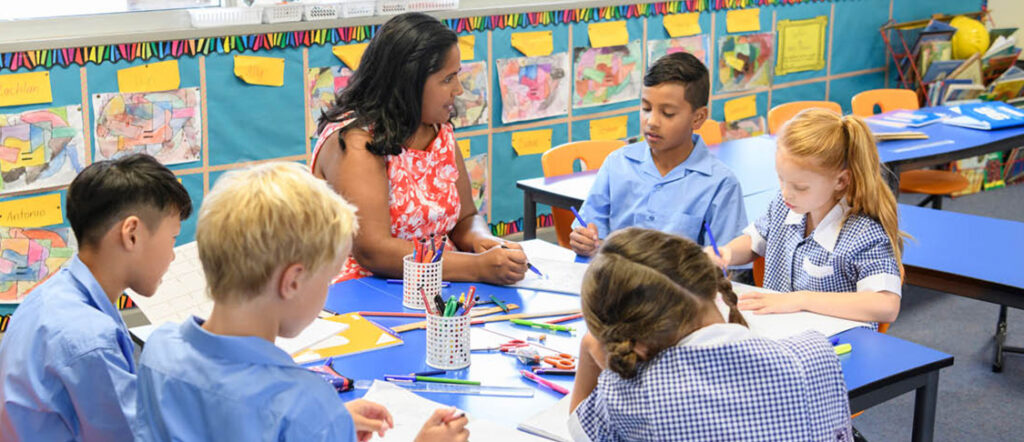Supporting your child’s learning journey from Year 1 to Year 6 involves more than just helping with spellings or times tables. It’s about nurturing their development into resilient, independent thinkers . Here are some creative and effective ways to support your child’s education, making it a fun and engaging experience for you both.
Support Their Learning
1. Read with them
Reading together is one of the most effective ways to support your child’s learning. Be a reading role model by letting your child see you read. Engage in conversations about the story, characters, and plot. Predict what might happen next and analyse the features of the story.
Example: Every night, spend 20 minutes reading a story together. Choose a book your child is excited about and ask questions like, “What do you think will happen next?” or “Why did the character do that?” to engage them in the story.
2. Establish a Homework Routine
Focus on setting up a good study routine rather than stressing over individual assignments as they come. Designate a regular study time free from distractions. Keep sessions short and spread them out over the week to avoid stressful cramming sessions.
Example: Finda space in the house that is quiet and distraction-free for your child to study. Set a timer for 30 minutes each evening dedicated to homework or reading time. If there’s no homework, use the time for educational games or exploring a new topic online.
3. Be Encouraging
Given the importance of this time to children’s educational future, as parents we can sometimes become hyper-focused on our child’s areas of weaknesses and how to improve. But remember that children are motivated to learn by rewards and positivity. Motivate your child by focusing on their strengths. Show interest in their schoolwork and praise their achievements. When helping with homework, emphasize the correct parts and gently guide them to self-evaluate and identify areas for improvement.
Example: When reviewing homework, start by identifying what your child did well: “You did a great job on these math problems!” Then, guide them to think about improvements by asking, “What do you think we could do differently here?”
4. Incidental Learning
We are surrounded by opportunities to learn in everyday activities! Use these to your advantage to reinforce learning. Cooking can teach reading and math skills, while shopping can help with number knowledge. Engage in games that promote literacy and problem-solving.
Example: While baking cookies, ask your child to read the recipe aloud and measure t
he ingredients. This helps practice reading and math skills in a fun, practical setting.
5. Have Interesting Conversations
Engage your child in thought-provoking discussions based around their interests. Ask intriguing questions to spark their imagination and improve their verbal articulation skills. Share your own daily experiences to model good conversational habits.
Example: At dinner, instead of asking, “How was school?” try asking, “If you could invent a new game, what would it be like?” or “What’s something interesting you learned today?”
Use Downtime Positively
1. Make Space for Unstructured Free Play
Children are children at the end of the day, and as important as it is to promote routine and structure as they grow, it is also important not to ignore their current needs to be creative, free and sometimes messy! Balance structured activities with unstructured free play. Allow your child to use their imagination and creativity, whether it’s building forts from sofa cushions or exploring nature in the backyard. Let them go wild!
Example: Give your child an afternoon with no planned activities. Provide materials like blocks, art supplies, or old cardboard boxes and let them create their own games and structures.
Incorporate creative projects into your child’s learning routine. Building models, writing stories, and performing plays can make education engaging and memorable.
Example: Have a “build your own planet” project where your child can use craft supplies to create and describe a new planet, including its environment and inhabitants.
2. Foster Their Passions
Encourage your child to explore their interests through projects that expand their skills. Whether it’s building a bird box or researching football strategies, make learning relevant and exciting to your child That way you will find you need to push them less.
Example: If your child loves animals, work on building a birdhouse together. Research different types of birds and what kind of houses they prefer, integrating science and craftsmanship into the project. But this can work with any interest.
Integrate music and art into your child’s learning. Use songs to memorize facts, create art projects related to different subjects, and encourage creative expression. Children can be quite expressive and at a younger age, find it easier to learn using their senses!
Example: Learn multiplication tables by creating songs together. Encourage your child to draw scenes from a book they’re reading or make art projects related to different subjects they’re studying.
3. Visit Interesting Places
Bring learning to life by visiting museums, parks, historical sites, and nature reserves. Hands-on experiences can significantly enhance your child’s understanding of various subjects.
Example: Plan a family trip to a local museum or historical site. Engage with the exhibits by asking your child what they think about the artifacts and how people lived in the past.
Nature offers endless learning opportunities. Go on nature walks, visit parks, and explore local wildlife to enhance your child’s understanding of the natural world.
Example: Spend a weekend afternoon at a nature reserve. Bring along a notebook for your child to sketch plants and animals they see and discuss their findings.
4. Support Friendships and Social Interaction
Help your child develop social skills by encouraging participation in group activities and facilitating playdates. Teach them to be good friends and to see things from others’ perspectives.
Example: Arrange playdates or join local clubs and activities. Encourage your child to invite friends over for a group project, like creating a backyard obstacle course.
5. Give Them Chores
Assigning chores helps children develop life skills, independence, and a positive attitude. It also builds their self-esteem and teamwork skills.
Example: Assign age-appropriate chores such as sorting laundry, setting the table, or watering plants. Model for them how each task is done and explain why it’s important.
Prioritize Resilience and Well-Being
1. Teach Them to Fail Positively
Celebrate failures as learning opportunities. Encourage your child to view mistakes as steps towards improvement. Foster a growth mindset by praising their efforts to overcome challenges.
Example: When a Lego tower collapses, celebrate the effort, and discuss what can be learned: “That was a tall tower! Good job! What do you think we could do to make it stronger next time?”
2. Encourage Them to Set Goals
Teach your child to set realistic goals and work towards them. Help them break down their goals into manageable steps and support them in planning and achieving these mini goals. Try using visual ways of representing these goals, especially for younger children who may not remember these goals all the time.
Example: Help your child set a goal like reading a book a month. Break it down into smaller steps, like reading a few chapters each night, and celebrate each book they complete. You could use a chart where your child puts a sticker for every chapter they complete, and once they reach the end, they are given a reward for finishing the book!
Recognize and reward your child’s efforts to build their confidence and encourage a positive attitude towards learning.
Example: Create a reward chart where your child earns stars for effort in tasks like reading, completing chores, or trying new things. Offer a small reward for earning a certain number of stars.
3. Encourage a Healthy Lifestyle
Ensure your child gets plenty of physical activity, eats well, and has a regular sleep schedule. A healthy lifestyle is essential for optimal learning and brain function.
Example: Plan active family outings like bike rides, hikes, or trips to the park. Ensure your child has a balanced diet and a regular bedtime routine.
Dedicate time for family learning activities. This could be a science experiment, a history documentary, or a math puzzle. Learning together can strengthen family bonds and make education more enjoyable.
Example: Dedicate one evening a week to a family learning activity, like a science experiment (making a volcano) or a geography game (map treasure hunt).
4. Put Limits Around Screens
While technology can be educational, it’s important to balance screen time with other activities. Set consistent limits to ensure your child engages in a variety of learning experiences.
Example: Establish a rule of no screens during meals or before bed. Encourage activities like drawing, playing board games, or reading during these times instead.
How can Educate Excellence help?
Here at Educate Excellence we provide support for both parents and children throughout primary school. If you need help or support during this time, please contact either Fayas, the head of education, or our parent liaison officers s who will be happy to provide advice where they can.
Supporting your child’s education from Year 1 to Year 6 requires a combination of academic encouragement, emotional support, and creating a positive learning environment. By implementing these strategies, you can help your child become a resilient, independent thinker while making learning a fun and rewarding experience. Remember, your involvement and enthusiasm in modelling learning are key to your child’s educational journey.

